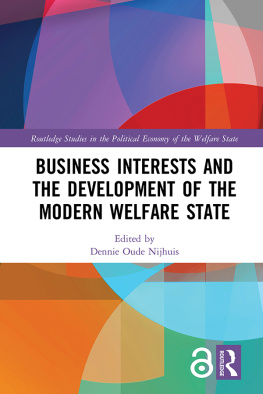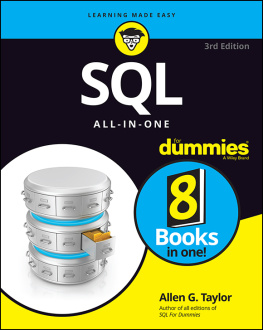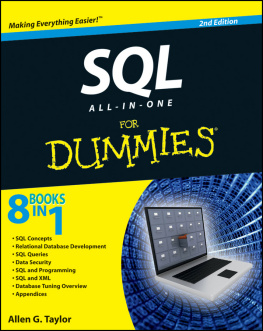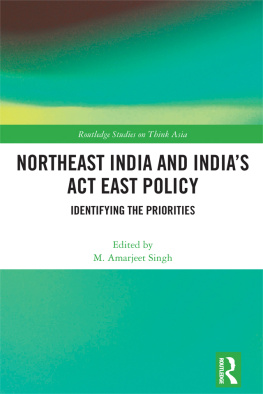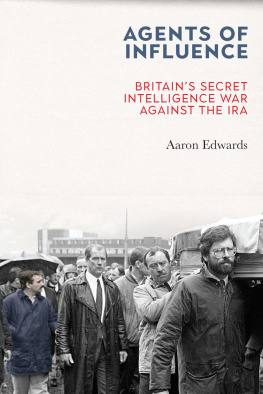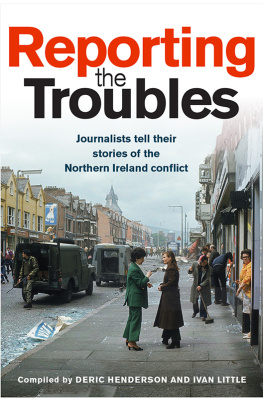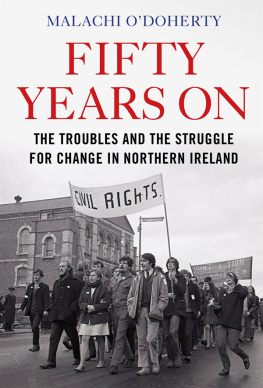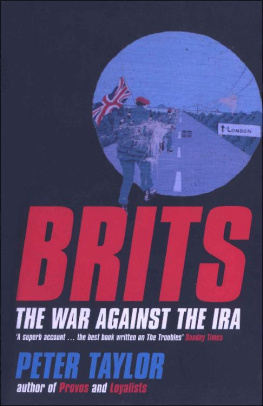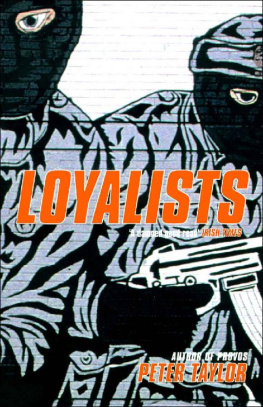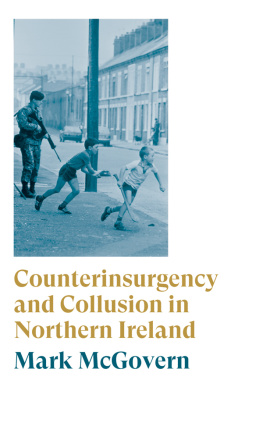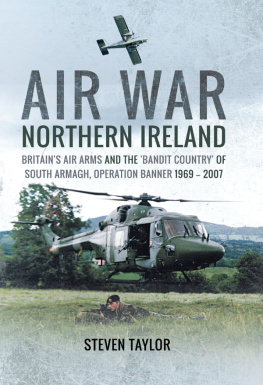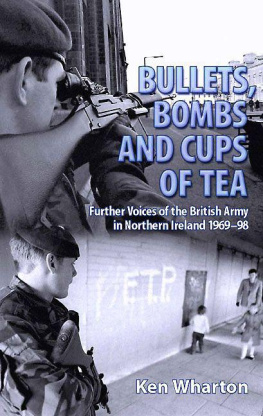Beating the Terrorists? Interrogation in Omagh,
Gough and Castlereagh
Smoke Ring: The Politics of Tobacco
Stalker: The Search for the Truth
Families at War
States of Terror: Democracy and Political Violence
Provos: The IRA and Sinn Fein
Loyalists

To Sue, Ben and Sam
Contents
I find acknowledgements almost the most difficult part of writing a book, not least because of the fear of forgetting to mention someone whose contribution or assistance was so vital. If I do, I hope they will forgive me and still accept my gratitude. These words are usually written when the long labour of writing is done a task which, though lonely, is in reality the fruit of the labours and assistance of many. Provos, Loyalists and now Brits, which together make up the contemporary historical trilogy of the current Irish conflict, could not have been written without the enthusiasm and dedication of the team that I worked with in making the BBC television series on which the books are based. Sam Collyns was the best series producer I could have wished for, was great to work with and always believed there was light at the end of the tunnel if we just persevered; assistant producer Julia Hannis displayed her customary tireless energy in tracking down unfindable people as well as generously checking facts for the book; film archivist Stuart Robertson found revelatory footage to illustrate our theme, and executive producer Peter Horrocks kept the lightest touch on the tiller and always moved it in exactly the right direction. Im also grateful to all my BBC colleagues for their support with the series and the book. At one stage I was minded not to write it but was told by friends, colleagues and others that I must, on the grounds that Provos and Loyalists were only two-thirds of the story. I hope they are not disappointed.
Thanks, too, to all those without whose remarkable interviews neither book nor series would exist. Many took great risks in co-operating with Brits both on and off the record and many of their names I cannot mention. They know who they are and I am deeply indebted to them. Many are featured in the book under pseudonyms marked by inverted commas. Im also grateful to Brigadier Sebastian Roberts of the MOD who supported the project from the start and did all he could to assist despite the fact he was not able to help with Special Forces; and to RUC Chief Constable Sir Ronnie Flanagan and his colleagues who went out of their way to provide access to individuals who enabled us reflect such a vital part of the story.
At Bloomsbury, Bill Swainson was a cool and incisive commissioning editor who, when it became clear the book was going to overrun, encouraged me to get the story down first and worry about length later. Brits is much longer than originally envisaged and would have been even longer without the cuts overseen by Bill and Pascal Cariss, who brilliantly edited and improved the text. The book is infinitely the better for it and I am indebted to them both as well as to Edward Faulkner, who so meticulously put the jigsaw of text, changes and rewrites together and to Douglas Matthews for his excellent index. Im grateful to my agent John Willcocks who sorted out the contractual side, leaving me free to get on with the writing, and also to David Hooper for his valued legal advice.
Finally, my thanks to my family, Sue, Ben and Sam, who supported me with love and patience throughout the long months and encouraged me to smile, chill out and take Josh (our dog) for a walk whenever the clouds seemed to darken over the laptop. They assured me I would get there in the end. I did. I hope Northern Ireland does too.
Introduction
FranksStory
14 Intelligence Company known as the Detachment or Det is the armys most secret undercover surveillance unit in Northern Ireland, so secret that it doesnt exist. Its operators have no names, identities or numbers. They are the eyes and ears of the SAS and the RUCs Special Branch the men and women trained to gather vital intelligence by breaking into IRA mens houses, bugging or jarking IRA weapons and vehicles and working undercover at huge personal risk. Regular soldiers call them The Muppets because of their various disguises. Since its formation in 1973, 14 Intelligence Companys role in the war against the IRA has been critical, latterly playing a vital and unacknowledged part in helping to bring the IRA to the negotiating table.
Frank is the only operator to have survived capture by the IRA although he stopped three bullets in the process. He has no doubt about the Dets impact on the conflict. It got to the stage where the IRA couldnt come outside their front door without being put under surveillance and tracked. We knew where they were going, what vehicles they were using, where they were getting their weapons from and where they were hiding them. By the end of the 1980s, they didnt know which way to turn because we were there all the time. Technology gave us the upper hand even more. We were able to watch them from a great distance, photograph what they were doing and listen to them. We were a very small organization but we gave an awful lot. Over the years my particular unit lost nine operators, but we accounted for a lot more of the enemy. The irony is that because 14 Intelligence Companys existence and activities are so sensitive, neither the army nor the MOD can publicly pay tribute to it.
Hanging on Franks wall is a graphic souvenir of his many years with the Det in Northern Ireland. It shows four men wearing balaclavas, bomber jackets and trainers emerging from an old VW Passat, brandishing a Browning 9mm revolver, a machine pistol and an HK 53 assault rifle. Inscribed in a circle round them is the Dets unofficial motto: Go out into the highways and hedges, and compel them to come in. Theres little doubt who they are. When I asked where the words came from, Frank left the room and returned with a large family Bible open at Luke 14 verse 23. It wasnt quite the context that Luke intended.
Frank first served in Northern Ireland in the late 1970s as part of the regular army but he grew bored and frustrated just wandering around, showing the flag, offering yourself as an occasional target and achieving very little. He says he felt like a mushroom, being kept in the dark and never really knowing what was going on. On the rare occasions when soldiers did find a weapon, he felt they were being given it by other agencies just to keep them happy. Clearly his frustration showed as did his potential. He finally escaped from the mind-numbing routine and became part of a Close Observation Platoon (COP), trained by the SAS, which was more exciting than engaging the locals in polite conversation. But he still wasnt satisfied and wanted to be closer to the action, to the sharp end of the war. Some months later, an instructor asked him if he might be interested in a more specialist job, more to the cutting edge. Frank decided he had nothing to lose and applied for selection, although he had no clear idea of what he was being selected for or what the specialist unit was called. He discussed it with his father who advised him, Keep your mouth shut, do your best and get on with it.
He arrived at a secret location in England and was shown into a hut with a blackboard on the wall. Frank read the chalked-up words. Basically it was a declaration that you gave up all your human rights and they could do what they wanted with you. Your rank meant nothing and your name meant nothing. You were just a number from then on. He was given a piece of paper to sign, signifying that he had read and understood the score. Then the psychological deconstruction began. Theyre only looking for a certain kind of person and they start weeding them out from the word go. Any Walter Mittys and James Bonds are soon on their way. Each potential recruit had been given a kit list of things to bring. If he or she arrived with anything extra, like love-letters, they were immediately taken away. One of Franks intake, a Royal Marine officer, had a teddy bear in his suitcase. He never saw it again, and he didnt make it through the course. The three-week selection process, run by the SAS and experienced Det operators, was the most physically exhausting and mentally draining experience Frank had ever undergone. Of the 130 who had been accepted for selection, only 30 passed and were sent for continuation training at another Special Forces secret camp in Wales.




